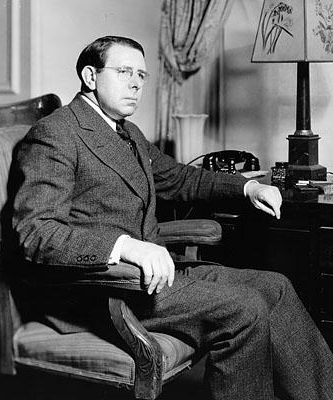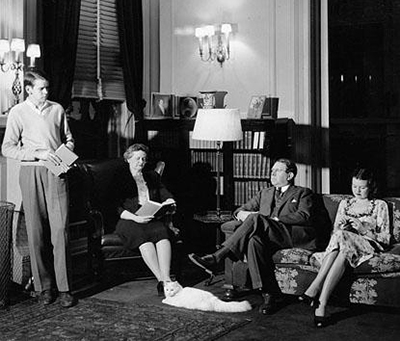17 Nov. 1888–6 Mar. 1949
See also: Joseph Melville Broughton, Research Branch, NC Office of Archives and History, Alice Broughton

Joseph Melville Broughton, governor of North Carolina and U.S. senator, was a Raleigh native, the son of Joseph Melville, head of the real estate firm of J. M. Broughton and Company, and Sallie Harris Broughton. His uncle, Needham Bryant Broughton operated a printing business. Graduating from the Hugh Morson Academy in 1906, the young Broughton entered Wake Forest College, graduating and entering law school there in 1910. That same year he was admitted to the bar, but he chose not to begin practice immediately. From 1910 to 1912, he was principal of the Bunn High School. In 1912 he was a reporter for the Winston-Salem Journal for a few months. He attended Harvard Law School for the 1912–13 year and began practicing law in Raleigh in 1914.
Broughton rapidly became involved in political and civic affairs in his native city. He had campaigned for Wilson in 1912, while a student at Harvard. Back home, he served as chairman of the Democratic party executive committee for Wake County from 1914 until 1916. In 1918 he was appointed to the Wake Forest College Board of Trustees, a membership he was to hold until his death, except for one year. At the same time he became a member of the board of trustees for Shaw University and began service of many years as its general counsel. He was president of the Raleigh Chamber of Commerce in 1918. During the 1920s he served on the Raleigh School Board (1922–29) and was twice appointed city attorney (1921–24).
Broughton twice won election to the state senate, serving from 1926 to 1930. As a member of the General Assembly, he pressed for extension of the school term and for workmen's compensation legislation. He also introduced and sponsored the Australian Ballot Act (1929). As a lawyer, he built up a very extensive civil practice, shunning criminal cases. In 1933 he served as president of the Wake County Bar Association, and he headed the North Carolina Bar Association in 1936. Also in 1936 he delivered the keynote speech at the Democratic State Convention. An active churchman, Broughton served as the Protestant chairman of the North Carolina Conference of Christians and Jews.
In 1940, Broughton ran for governor, winning the primary against six opponents and avoiding a second primary when runner-up Wilkins P. Horton of Pittsboro declined the opportunity to call for one. Broughton campaigned strongly for Roosevelt and carried the largest gubernatorial vote in state history to that time, becoming the first Raleigh native to be elected. As wartime governor, his achievements covered a broad range: enactment of a teachers' and employees' retirement plan and a salary raise for teachers, extension of the school term to nine months and addition of the twelfth grade, state aid to public libraries, reorganization of and larger appropriations for state hospitals and correctional institutions, aid to agriculture, organization of the Civilian Defense program, establishment of the state Medical Care Commission, and removal of the sales tax on food for home consumption. As North Carolina's first "regional governor" in several years, Broughton was active in regional and national affairs. He served on the executive committee of the National Governors' Conference and participated in National Planning Association efforts for the postwar period. In 1944 he was nominated for vice-president when Roosevelt refused Wallace a second term.

Broughton maintained many interests. From 1941 on, he served on The University of North Carolina Board of Trustees. He was president of the North Carolina Engineering Foundation, which supported the School of Engineering at North Carolina State College. He served as president of the Roanoke Island Historical Association and was a member of the Raleigh Board of Directors of Wachovia Bank. He continued an extensive law practice and engaged in many business activities. He acted as general counsel for the Flue-Cured Tobacco Cooperative Stabilization Corporation and the North Carolina State Ports Authority, both of which he had helped establish.
In 1948, Broughton ran for the U.S. Senate and defeated William B. Umstead, who had been appointed to fill the unexpired term of Josiah Bailey. Broughton took the oath of office on 31 Dec. 1948 and served the few months until his death. Throughout his career, he represented those not connected with the monied interests and the so-called machine, and he never lost a political contest.
An ardent Baptist, Broughton served as Sunday school superintendent at Tabernacle Baptist Church in Raleigh and taught the Men's Bible Class there for twenty-five years. When he went to Washington, he organized the Broughton Bible Class at the First Baptist Church.
On 14 Dec. 1916, Broughton married Alice Harper Willson, daughter of William Willson, grand secretary of the Grand Lodge of Masons of North Carolina. She, like her husband, had been born, reared, and educated in Raleigh. They had four children, Alice Willson, Joseph Melville, Jr., Robert Bain, and Woodson Harris. Broughton died of a massive heart attack and was buried at Montlawn Memorial Park in Raleigh.